Nathan Lively's Blog, page 32
April 6, 2014
Learn A Language And Get A Job 5 Times Faster


 I’m going to tell you the secret to learning a second language. I won’t even make you scroll to the end of the article.
I’m going to tell you the secret to learning a second language. I won’t even make you scroll to the end of the article.
It’s confidence.
Done.
Are we there yet?
Just kidding about the done part. If confidence were that easy to turn on then you would have done it already. But for most people, it’s scary as fuck. I don’t mean monkey in the closet scary, I’m talking about studying Spanish in your room for five years and without ever speaking to a native speaker kind of scary. That kind of subconscious fear seems logical, but it really isn’t.
It seems logical to send out fifty resumes to people you don’t know. It’s a lot harder to make three phone calls to people in your circle that could actually make a difference. It seems logical to hang out at bars and try to meet people. It’s a lot harder to invest your energy to make a profile on OKCupid and look for people who are more likely to be compatible with you.
Let’s compare two real people. One is Nathan (that’s me!). The other is a Czech woman I met in Lisbon, Portugal. Let’s call her Jana.
Nathan
Portuguese Study: 16 months
Level of achievement: comprehend most conversations
Resources: private tutor, 2 universities
Jana
Poruguese Study: 3 weeks
Level of achievement: participate in most conversations
Resources: a dictionary
Are you kidding me!?!
Granted, this was her third or fourth language, but there was something very different about how she spent her time in Lisbon. I spent my first three months only going to classes, avoiding much interaction with the locals. I went broke in six months and was planning my escape back to NYC when I finally found a job. Jana found a waitressing job in her first week. This forced her into constant communication. She also carried the dictionary with her wherever she went and would hold up the checkout line at the grocery store searching for the right word. Can you imagine your waitress stopping in the middle of your order to look up a word in the dictionary? That’s confidence.
What’s the hold up?
I’ve always been an A student even when I didn’t get A’s. Being an overachiever has its benefits, but one big drawback is that it’s easy for me to get stuck in an endless cycle of preparation and never take action. Thus, I would rather study Portuguese for 10 years and get it perfect before actually going to Portugal. But Jana didn’t give a fuck. She was going to get a job and learn Portuguese despite the potential awkwardness of that strategy.
Guys, what I want you to take away from this short story is that it’s a lot easier for girls to get ahead in the world. Wait, that’s not right. What I want to show you is that if you commit to bold action you can speed up the learning curve exponentially. When you get nervous because you are about to break some social custom or enter into a potentially awkward situation, observe that energy and move past it before you get bogged down.
Epilogue
So I did eventually learn Portuguese. It took about two years. I don’t get to use it that often since I moved back to the US, but I’ll never forget that lesson.
This article Learn A Language And Get A Job 5 Times Faster appeared first on Sound Design Live. Sign up for free updates here.
Read Related Articles:
Learn from the Sound Engineers for Tori Amos, Prodigy, and The White Stripes Online
Beyond FOH: Job Search Advice For Sound Engineers
How To Automate Your Job Search

March 23, 2014
It’s My Birthday. Have Some Cake!



Super Sound Hero
Sound Design Live is three!
2013 was my best year yet. I moved beyond producing podcast interviews with sound designers and started interviewing experts in related fields to help audio professionals (like me!) deal with all of the challenges they face on the job. I also began publishing my own articles and reviews to dig deeper into new subjects that came up during each interview.
2014 is going to be even better, and I want you to be in on the action. So, for my birthday I only want one gift:
Fill out this 5 question survey. It will take you 30 seconds and I’ll give you a 50% discount on my book. Thanks!
[contact-form]
This article It’s My Birthday. Have Some Cake! appeared first on Sound Design Live. Sign up for free updates here.
Read Related Articles:
Your Questions For Bob McCarthy
Kickstart This!

March 16, 2014
Keep Calm and…Too Late: the Concert from Hell


 What follows is an awesomely painful story of a tiny technical problem that destroyed an entire concert.
What follows is an awesomely painful story of a tiny technical problem that destroyed an entire concert.
I share it with you to illustrate one of the most important points that Darryn De La Soul made in our interview: Don’t panic.
As sound engineers, you know that anyone working on live events has ample opportunity to lose their shit. Aside from the technical problems that can ruin a show, there are lots of egos bumping into each other and other elements that easily combine to create a perfect storm of emotional stress. Starbucks has spent over two million dollars on its employee training program. New employees learn how to deal with stressful situations by writing down exactly how they will respond. If a customer gets upset and starts yelling, how do you respond? Can you handle it?
Working in live audio is a lot like working at a Starbucks; a Starbucks that’s on fire, and careening down the highway at 105mph. This is a service industry and it is as much about managing people as it is about fixing technical problems. As you read Darryn’s story, imagine yourself in her shoes. What would you do?
Crackle, Snap, Pop
by Darryn De La Soul, from the January 2012 edition of FOH
I am not a Roman Catholic, but I imagine this is what it feels like to enter the confessional. To expose my sins and hope fervently for the forgiveness that will make the rest of my life livable.
What follows is a tale of woe, destruction, humiliation and anguish. I wish I could say it has a happy ending, but it doesn’t.
It all began a long, long time ago. I was young and I was cocky. I was also the newly-engaged assistant house engineer for a venue in East London.
Up until then, I’d been a studio-bod, but I’d managed to talk myself into this live job, not realizing how different the two environments were. My boss (and engineer-extraordinaire, who shall remain nameless lest my shame taint his relationships with the currently hip and famous) was due some annual leave shortly after my appointment.
Before he went away, he took me to one side to discuss the upcoming gigs. One in particular was very important — a fans-only gig for a band that was just making it. Twenty-four hours later, I had enough experience to know that this should have set alarm bells ringing, but on that fateful day, I was still green, and no such jangling occurred.
 Fortunately for me, the band has since dwindled into obscurity, but at the time, they had just crossed the channel, having played live on mainstream French radio to an audience of millions. They were on their way back to London triumphant, preparing to give succor to their fans by holding a non-ticketed, invite-only, intimate performance for 350 of their most rabid followers.
Fortunately for me, the band has since dwindled into obscurity, but at the time, they had just crossed the channel, having played live on mainstream French radio to an audience of millions. They were on their way back to London triumphant, preparing to give succor to their fans by holding a non-ticketed, invite-only, intimate performance for 350 of their most rabid followers.
Oh, the arrogance of youth!
On the advice of my now-absent boss, I got a freelancer in to help. Not on the advice of my boss, who recommended a “more experienced live engineer,” I called on the services of a best friend and studio-mate on the brink of starvation and in need of the dollar.
Said starving mate had much experience on the noise-making end of the microphone (he now works for a superstar in the studio), but at the time, he’d never engineered a live gig in his life. Nor has he since. I wonder why.
Anyway. The soundcheck goes without a hitch. Most of the support band goes without a hitch. Until the last song, during which an ungodly crackle, straight from the maws of Satan himself, sets up home in my system and proceeds to eat up bits of audio.
As it had only happened in the last song, and because I was a dumb-ass, inexperienced fool, I chose to ignore its presence during the changeover. With all channels now mercifully muted, the hiding-head-in-the-sand policy seemed to be working, and I got my stage rearranged in readiness for the much-anticipated main event.
The headliners amble onstage, looking every bit as cocky and pleased with themselves as a band-on-the-rise, at the end of a very successful European tour can, and should, be.
“Good evening to you, London!” cries the front man.
“Bad evening to you, Darryn!” cries the infernal crackle that has now trebled in volume and noticeability, is painful to the ears and is proceeding to devour all sound anyone would have paid money to actually hear.
The band braves it on through half a song. I brave it on through half a song. But God is getting even with me for something I really can’t remember doing, and my night of hell starts its steady decline from purgatory to the roasting fires, spewing brimstone (what the hell is brimstone, anyway?) deep into my soul.

To make matters worse, the devilish cackle is intermittent, but every time someone on stage moves (which, um, is quite often, really), this unbearable crackle rips through the room.
I have no idea what to do. Thus far in my month-long live career, I have fixed Röyksopp’s sampler, I have lifted a few earth switches and soldered a few cables. I have not, however, faced a situation in which God and the devil are conspiring against me in an act so unnatural, horror movies should be made of it.
In the cold light of the following day (oh, the glory of hindsight!) all I needed to do was mute and/or PFL channels until I found the channel that was exuding the aforementioned corruption and filth. In the glaring, hot, sweaty light of the moment, all I did was panic.
I froze. A rabbit in the headlights has more chance of salvation than I did that night. And then I made the error to beat all errors. I followed the advice of everyone who was screaming at me.
A little list — People Who Were Screaming At Me:
The Band — from the stage, over the microphone. “F*cking sort it out! You useless c*nt!” etc etc. Constantly, and at length. Since then, I have had the presence of mind to mute the microphones of people who speak to me like that — I’m such a bad engineer, jeez, I can’t figure out why you’ve gone quiet all of a sudden?!
The Baying Mob — following the example of their idols. Did I mention I was mixing on a balcony? Built purely for the mix position. Normally, this is my least-favorite mix position. On this occasion, I have never been more grateful for a physical divide between myself and the audience who, by now full of beer and anger, were turning on me. God bless the security team who literally prevented me from being lynched that night.
The Band Manager — “It’s the kick drum, it’s the kick drum!”
The Support Band Manager — “It’s the guitar, it’s the guitar!”
Other Random VIPs who had access to my balcony — “It’s X!” It’s Y!” “It’s your aunty’s brother’s dog!”
The Band — again and again, over and over.
An even littler list — People Who Were Not Screaming At Me:
My half-starved studio mate, who was panicking in the background and hiding as far away as he could.
To cut a long story short:
The gig limped on for a few more devilimbued crackly songs until the band gave up and the whole thing fizzled out.
A blessed bartender (may there be a place for her at the right hand side of God for this act of charity) brought me a VERY large whiskey when events drew to their excruciating close.
I drank said whiskey very quickly, and the same made-in-the-image-of-God angel gave me the rest of the bottle.
The next day, I had some facing-the-music to do. A deluge of complaints was coming in via email and over the phone. I understand much cash was refunded. Upon investigation, we discovered that a freak, untimely accident of beer-pouring by a member of the support band had combined with the only shoddy bit of soldering in an otherwise immaculate installation. This had caused liquid, copper and the-powers-that-be to join forces, resulting in a short that only connected when someone stood on a particular part of a somewhat springy stage.
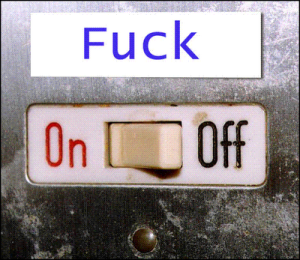 Yes, I should have identified the channel and muted it, but I didn’t. Yes, I should have told all the “engineers” around me to f*ck off and give me time to think and investigate, but I didn’t. Yes, I should have been more in control, but I wasn’t.
Yes, I should have identified the channel and muted it, but I didn’t. Yes, I should have told all the “engineers” around me to f*ck off and give me time to think and investigate, but I didn’t. Yes, I should have been more in control, but I wasn’t.
But, as much as this incident still haunts my every professional move, I have come to realize a few things. The world was still intact afterwards, the earth still spun, and the laws of nature had not been abominated. What we do is entertainment. It is not the be-all and end-all of life as we know it, and if it sometimes goes wrong, then so be it. Really. Get over it. There is more uproar in our modern society over a buzzy PA than in the seemingly daily rise in petrol prices. More people complain about a poorly audible vocal than the continued instability in the Middle East.
And let the person who has never had a bad day at work cast the first stone.
This article Keep Calm and…Too Late: the Concert from Hell appeared first on Sound Design Live. If you found it helpful, please donate to show your support.
Read Related Articles:
Mixing The Biggest Festivals In Europe with Dave Swallow
Learn from the Sound Engineers for Tori Amos, Prodigy, and The White Stripes Online
How Much Do Live Sound Engineers Make?

March 9, 2014
Learn from the Sound Engineers for Tori Amos, Prodigy, and The White Stripes Online


There’s one obvious way to fix live audio education, and Darryn De La Soul figured it out.
In this episode of the Sound Design Live Podcast I talk to the owner of SoulSound, Darryn De La Soul, about her life’s mission to help sound engineers improve employability and find work. We also discuss emotional intelligence for audio engineers, the difference between a career ladder and a career web, why universities don’t provide work experience for their students, how labor buying and subcontracting work, and how Darryn built one of the biggest contact lists in the pro audio industry.
What we’re offering is the opportunity to improve employability. I want my people to be working, otherwise, what’s the point?
Details from the podcast:
 All music in this episode by The Blackfires
All music in this episode by The BlackfiresLooking for the SoulSound membership discount? Make sure to sign up for my mailing list; I’ll send it out on April 30th.
SoulSound on Twitter
SoulSound will launch on April 30, 2014 at PLASA Focus.
The Getting A Foot In The Door eBook.
Sound Engineers: Paul Epworth (Adele), Marcel van Limbeek (Tori Amos), Justin Grealy (The White Stripes), Jon Burton (Prodigy), Tony Andrews, Bob Heil
Ears = IEM
The Power Of Habit by Charles Duhigg
Alchemea private college for audio, SSR
How to protect yourself at a gig:
Grow a thick skin.
Be aware of what’s your fault and what’s not (i.e. take responsibility). Never feel bad about something that is outside your control.
There are times when you are allowed to stand up for yourself and say, “Look, this isn’t helping.”
Quotes:
“Nothing is ever advertised. Most of it word of mouth.”
“The only way to make money is in the live industry.”
“It’s a people business. A band has to trust you before they will take you on tour.”
“If you take that chance, make sure you are sober.”
“It’s a very lonely job. You’re on your own.”
“People management is a massive part of this job. If you struggle with that, you will struggle with the job.”
“I made it my mission to never walk past a venue without demanding work experience for my students.”
“Over 80% of our students were working [after finishing the course].”
“In this business, no one [hires you] off of a CV. You need someone to say, this guy’s OK.”
“Most of the degrees out there don’t really mean much because they haven’t taught you how to push the boxes and load the truck and be awake for 15 hours and still have a smile on your face.”

This article Learn from the Sound Engineers for Tori Amos, Prodigy, and The White Stripes Online appeared first on Sound Design Live. If you found it helpful, please donate to show your support.
Read Related Articles:
How Much Do Live Sound Engineers Make?
10 Critical Tax Questions Answered For Sound Engineers
The Sound Engineer’s Pain-Free Guide To TurboTax

March 6, 2014
Your Questions For Bob McCarthy


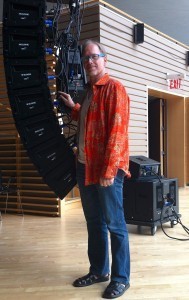 On March 18th, I will interview Bob McCarthy for his 2nd appearance on Sound Design Live. He has graciously offered to take questions from the Sound Design Live audience while he’s here.
On March 18th, I will interview Bob McCarthy for his 2nd appearance on Sound Design Live. He has graciously offered to take questions from the Sound Design Live audience while he’s here.
Deciding where to put the speakers in your room? Send me a floor plan.
Want to optimize a sound system but not sure where to start? Send me your system design.
This is a great opportunity to get your questions answered and learn how to apply the information in McCarthy’s book, Sound System Design & Optimization, to your personal work and projects.
[contact-form]
This article Your Questions For Bob McCarthy appeared first on Sound Design Live. If you found it helpful, please donate to show your support.
Read Related Articles:
BOOK REVIEW: Sound Systems: Design And Optimization by Bob McCarthy
Sound System Design And Optimization with Bob McCarthy
Kickstart This!

March 2, 2014
Be Your Own Attorney: The Smart Business Guide For Freelancers
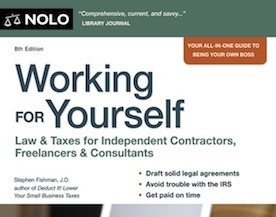

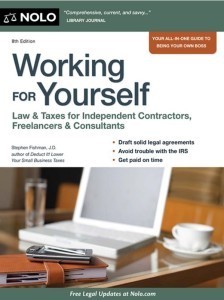 You may be an amazing sound engineer. You probably are, since you read Sound Design Live.
You may be an amazing sound engineer. You probably are, since you read Sound Design Live. 
But: are you in line with the law? Are you handling your business in a professional manner, protecting yourself from loss and planning for the future? Are you sure?
Reading Stephen Fishman’s Working For Yourself is one of the best ways to make sure that you are. I’ve read this book twice and I use it as an ongoing resource. Fishman has talked to a lot of contractors like you and me, and he explains the game in an easy to understand way. Let’s take a look at some of the most helpful points for audio professionals.
The Pros & Cons Of Working For Yourself
Pros
The first chapter of Fishman’s book is dedicated to the question, “Why do people do it?”
It’s a good question. Why go out on your own where you have to run your business and do the work, when you could just work for someone else and leave the the first part to your boss?
In my interview with him, 10 Critical Tax Questions Answered For Sound Engineers, both Fishman and I agree that it’s all about control. As an employee you must follow policy and complete work in a manner specified by someone else. Independent contractors thrive on controlling all aspects of our working conditions. We want to choose our clients, when we work, how much we make, and maybe most importantly, how we do our jobs.
With more control and agility, you should be able to make more money as an independent contractor. By making the right choices, you can maximize your personal value better than any employer. If I were to fill my schedule with gigs, that would be true, but the most important aspect of control for me isn’t money, it’s time. Being a freelancer allows me time to work on other projects that I care about, like Sound Design Live. I might make more money as an employee in the short term, but I’d rather focus on building an audience of life-long readers.

As a contractor you also have a lot more tax deductions that are not available to employees. See my article, Save $500 On Your Taxes This Year.
My favorite part about being a freelancer is that I feel agile. Any time I have a business idea I can immediately put it into action. I don’t have to convince anyone else of my idea’s validity. Does this mean that I have tried a lot of ideas that have failed? Yes. But they aren’t stuck in my brain, making me anxious and crazy with a lack of creative expression in my business.
Cons
My least favorite part about being a freelancer is the lack of support structures. When I go into the hotels and music venues where I work part-time, I get to see friends and colleagues. My favorite jobs of all time have been defined by relationships. Same with the worst jobs I’ve had. Being a freelancer means that I get a mix of the best and the worst, instead of being a member of a reliable group.
One of the biggest problems with working for yourself in the past has been the lack of health insurance. Not any more! Since October 2013 anyone can buy health insurance on the public exchange despite any preexisting conditions. Fishman predicted that many people would leave their jobs and go independent once they weren’t tied to insurance anymore, and he was right!
“So what do you do?” Do you have trouble answering this question at parties? I think more and more people are thinking of their work as a portfolio of services instead of a single job title. Many sound engineers have clients from more than one area like film and corporate AV. Some even work in completely different areas like massage and photography. I usually say that I’m a world-famous author. 

Legal Form For Your Business
You can pretty much skip the second chapter since, as confirmed by Fishman in our interview, there is really no reason for any sound engineer to be anything other than a sole proprietor, unless you have a partnership with someone else.
Pricing Your Services & Getting Paid
This is the most valuable part of the book. You have to take care of these things in a professional manner or you won’t survive. Or maybe you will, but you won’t be confident that you are protecting yourself and keeping all of the money you deserve.
Fishman includes an Hourly Rate Worksheet to help you calculate your fee, but this has never worked well for me. I usually put some unrealistic numbers into the worksheet for yearly profit. It’s more useful to just ask other local sound engineers what they charge, aka “investigating the marketplace,” which he also describes.
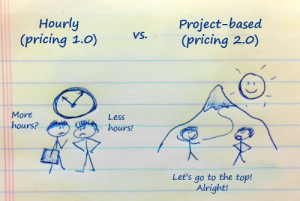 Fishman also explains different pricing models. You may only be familiar with charging by the hour, but the truth is that is often the weakest model because it doesn’t allow for any sort of compression. I’m in favor of a fixed and hourly fee combination. That way if work is going well I can take more breaks or finish early, therefore making my time more valuable, but I’m also protected against conditions out of my control. It usually goes something like this: Day rate $350, anything over 10 hours is billed at $50/hour. Because I really don’t want to work more than 8-10 hours, but if it has to happen, I want to feel compensated for the effort. I also try to upsell by packaging other equipment or services like live event recording and my wireless mix system.
Fishman also explains different pricing models. You may only be familiar with charging by the hour, but the truth is that is often the weakest model because it doesn’t allow for any sort of compression. I’m in favor of a fixed and hourly fee combination. That way if work is going well I can take more breaks or finish early, therefore making my time more valuable, but I’m also protected against conditions out of my control. It usually goes something like this: Day rate $350, anything over 10 hours is billed at $50/hour. Because I really don’t want to work more than 8-10 hours, but if it has to happen, I want to feel compensated for the effort. I also try to upsell by packaging other equipment or services like live event recording and my wireless mix system.
I’ve never had a retainer agreement with any clients, but one of the people I’ve interviewed on the podcast does and enjoys it. That way you still have the control of being an independent contractor, but more of the stability with guaranteed hours like an employee.
Performance billing and taking commissions are two things I’ve always been interested in, but I don’t know anyone who is using them as a sound engineer or designer. Basically you get paid according to the value of the results you produce. No one goes to an event because of the sound engineer who is working it, so it seems impractical, but there might be a way of profit sharing that would work. Let me know if you’ve seen this anywhere.
How and when you get paid should be described in your written agreement with the client. Fishman includes a simple sample you can fill out to build your own independent contractor agreement. I’ve been using it and modifying it with my own clients since reading this book. One of my clients even adopted it for their other contractors. When you are just doing work for a day this can feel like overkill, but ignoring the details will bite you in the ass so I demand that you follow these two rules:
 Write it down. If you agree on your rate and arrival time over the phone, email that client ASAP to have a written record. Simply say, “Hi Nathan, just confirming these details from our phone call.” People will appreciate your reliability. Event producers have a million details to keep track of. Don’t expect them to deliver on everything you just discussed over the phone while they were driving, drinking coffee, and thinking about their next phone call.
Write it down. If you agree on your rate and arrival time over the phone, email that client ASAP to have a written record. Simply say, “Hi Nathan, just confirming these details from our phone call.” People will appreciate your reliability. Event producers have a million details to keep track of. Don’t expect them to deliver on everything you just discussed over the phone while they were driving, drinking coffee, and thinking about their next phone call.Don’t make assumptions. Just because you have done the same event two years in a row doesn’t mean that it will pay the same or have the same responsibilities this year. You can still agree to do it over a text message, but email that client ASAP so that you know that they know that you know that they know. Otherwise, you’re going to end up working the load-out at 2am for pennies.
Fishman recommends asking for a down payment and periodic payment schedule. I typically only do this on jobs that will last for more than a week or bill for over $1,000. It’s completely reasonable to ask for ⅓ or ½ up front, especially for first-time clients.
When it comes to payment format, Fishman recommends accepting some form of electronic payment, like Paypal. I totally agree, but I’m not 100% on board with Paypal. I am still occasionally surprised by fees I wasn’t expecting and even had one client pay the wrong person. Instead, I recommend SquareCash. It’s unclear how long it will be a free service, but it’s super simple and I’ve convinced clients to use it who previously would only handle cash or checks.
Fishman’s book is also where I learned how to send invoices. You can see my process in Easy Invoicing For Sound Engineers. For example, instead of charging late fees, sometimes I will offer a discount for early payment.
Taxes & Savings
Fishman dedicates four chapters to dealing with taxes. I covered a lot of this in my last two posts: The Sound Engineer’s Pain-Free Guide To TurboTax and 10 Critical Tax Questions Answered For Sound Engineers. Fishman goes into more detail about avoiding and dealing with IRS audits in his book. He also goes into much more detail covering the deductions you can use to lower you income taxes and paying estimated taxes. I’ve never paid estimated taxes. Have you? I put 10% from all my income into a special savings account and use that to pay taxes yearly.
 The chapter about retirement options for the self employed was helpful, but I have to admit that I haven’t taken action on any of it yet (UPDATE: I just opened a Roth IRA at Ally Bank. I already had an account so it only too five minutes. Yay!) I would guess that there are many of you who put these kinds of financial responsibilities off just like me. You probably think it’s too complicated or boring. You should watch Ramit Sethi’s guide to automating your savings.
The chapter about retirement options for the self employed was helpful, but I have to admit that I haven’t taken action on any of it yet (UPDATE: I just opened a Roth IRA at Ally Bank. I already had an account so it only too five minutes. Yay!) I would guess that there are many of you who put these kinds of financial responsibilities off just like me. You probably think it’s too complicated or boring. You should watch Ramit Sethi’s guide to automating your savings.
When you watch it you are going to say, “But wait, that’s for employees who have a pay check every month. My income varies from month to month.” Ah-ha! I have an answer for you. I watched Sethi’s workshop with a bunch of freelance photographers who asked the same thing. His suggestion was to save into an account until you have six months worth of normal income, then setup the automation process to pull from that. Boom.
Read The Book
If you found any of this information helpful I encourage you to read Working For Yourself. Your situation is slightly different from mine and you should make your own business decisions. I’m sure you’ll come up with some good ideas. Let me know how it goes.
This article Be Your Own Attorney: The Smart Business Guide For Freelancers appeared first on Sound Design Live. If you found it helpful, please donate to show your support.
Read Related Articles:
10 Critical Tax Questions Answered For Sound Engineers
The Sound Engineer’s Pain-Free Guide To TurboTax
Save $500 On Your Taxes This Year

February 25, 2014
The Poor Man’s Galileo
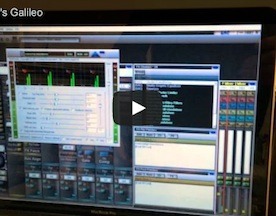

How much does a Meyer Sound Galileo cost? $10,000. How much does my Poor Man’s Galileo cost? $500 (assuming you already have a computer and audio interface).
Boom.
This happens to me a lot: I’m called to work on a small event that has just enough equipment to justify using some output processing for the speakers, but it’s not in the budget. That’s when I break out my Poor Man’s Galileo setup.
The Meyer Sound Galileo is a rack-mount loudspeaker management system with EQ, dynamics, delay, matrixing, and level setting. I wish I could have one at every event. Instead, I bring my Mac Book Pro with my RME Fireface 800 to run Software Audio Console with some free VST plugins. I use a ReaXcomp multi-band compressor on the inputs and ReaEQ and Dual Linkwitz-Riley Filters on the outputs.
This is the same setup I’ve been using for the last few years and on tour. If you know any better plugins, let me know in the comments below!
This article The Poor Man’s Galileo appeared first on Sound Design Live. If you found it helpful, please donate to show your support.
Read Related Articles:
How To Use Plugins with an Analog Console And Wireless Control
Sound System Design And Optimization with Bob McCarthy
Build A $100,000 Mixing Board

February 23, 2014
The Sound Engineer’s Pain-Free Guide To TurboTax
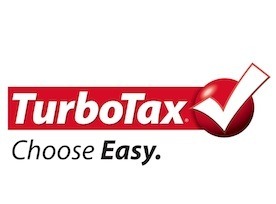

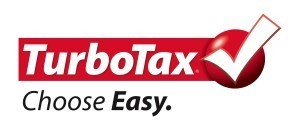 Are you a sound engineer? Do you hate taxes?
Are you a sound engineer? Do you hate taxes?
As sound engineers, taxes can be really complicated. We often have
multiple sources of income,
business expenses,
and lots of paperwork.
I’m not an expert and I make mistakes every year. In fact, this year I accidentally submitted erroneous information, so now I’m waiting for my 2013 return to get kicked back to me so I can submit it again. Hooray.
Don’t do what I did. Use TurboTax to make the process easier on yourself. Follow these tips gained through many mistakes (and talking to Stephen Fishman) and save yourself some pain.
[Disclaimer: I am not an accountant or a tax lawyer; I don't even play one on television. Please do not consider this certified legal advice.]
#1 Collect your income and expenses.
I keep track of this stuff all year long using the iExpensit iPhone app. I like it because it’s always with me and I don’t have to worry about holding on to receipts, even for cash, because the app stores a photo of each receipt for me. I used to try to enter everything into a spreadsheet at the end of each day, but I never managed to make it a habit and it was easy to forget things after the fact. Recording it at the time of transaction is best. At the end of the year I also usually go back and scan through my bank statement to see if I’ve missed anything.
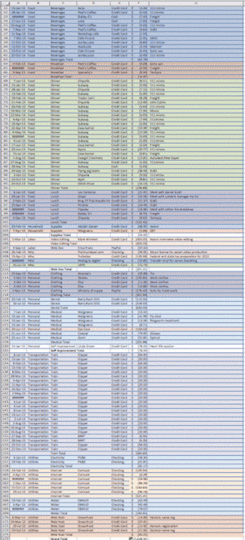 #2 Prepare a spreadsheet.
#2 Prepare a spreadsheet.In iExpensit you can export a report to Excel or a similar program. Organize your data by deleting columns you don’t need, separating expenses from income, and ordering everything by category. Some of you may be completely independent sound engineers, but I am also a part-time employee at a couple of music venues. In my case, I must separate my income out between what I earn as a freelancer and what I earn as an employee.
PRO TIP: In Excel, sort the data and then use the Subtotals command for each category or sub-category. Then collapse the data into something that’s much easier to view, like this →
#3 Choose TurboTax Home & Business.
You might ask, “Do you I really need it? It’s $50 more than the Deluxe edition. And what about the free edition?” Here’s a simple test. Go with with Home & Business if you:
Invoice clients directly; OR
Have received a 1099-MISC; OR
Plan on taking the home office deduction.
If you are a full-time employee at a theatre or venue and are only receiving W-2 forms, you should be fine with Deluxe. Still unsure? Use this handy reference.
#4 Input business income and deductions.
You’ll enter all of your 1099-MISC forms and income as a freelancer in the business section. Anyone who paid you $600 or more last year must send you a 1099 (and file a copy with the IRS) by January 31. Everything else is on you to report.
I know some people keep the money they made in cash off the books, but I report everything. I’m pretty sure the taxes I’m paying now are completely worth avoiding the headache of a messy audit down the road. I’ve never experienced one, but I’ve heard they can be terrible and drag on for months.
TurboTax does a pretty good job of guiding you on where to put what deductions. Anything they can’t categorize goes in the miscellaneous section at the bottom, including the money you paid for TurboTax last year. As you go through each section entering your deductions, make sure to mark them in your spreadsheet so that you don’t accidentally add them twice. I keep track of this by changing the background color of a row I’ve already used. At the end, as you can see in the image above, my spreadsheet looks like a pastel Christmas tree. I know this is time consuming, but if your marginal tax bracket is 25% (income from $36,250 to $87,850), you will save twenty-five cents in income taxes for every dollar you can claim as a deductible business expense.
Here is an overview of my income and expenses for 2013.

#5 Input personal income and deductions.
This is where you put in your W-2 forms if you were an employee last year, and deduct medical expenses. I usually don’t have much else for this section. One year I made less than $14,590 and could apply the Earned Income Tax Credit of $487. I hope none of you have to use that one, but it does happen.
#6 Error check.
Every year my returns create some kind of error. This year it was because I moved home offices and entered some numbers wrong. I got on the chat support and the TurboTax rep offered to call me up. He was nice and waited on the phone while I got it sorted out. Now I definitely feel like I got my money’s worth.
#5 Pay the man.
You’ll have a few different options for paying your taxes. I definitely recommend the automatic deduction from your bank account on April 15th. Don’t make yourself try to remember to send a check. Or, if you have the money now, pay it now.
One year I couldn’t afford the full amount and I requested to pay in installments. It was pretty easy. There is a service charge, but it was worth it. You can only do this once every five years, though.
The best tip I’ve heard for saving for taxes was from Darryn de la Soul. In Getting A Foot In The Door she says, “I personally found that if I saved 10% of each and every job, that equated – more or less – to the amount my tax came to after I had offset my business expenses. Start saving those little bits now.”
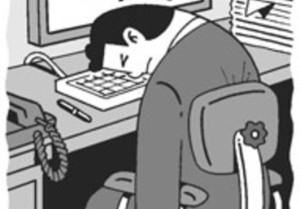 #6 What if I make a mistake?
#6 What if I make a mistake?Sorry, you’re fucked. Well, at least temporarily. E-filing your tax return is like dropping it in the mailbox. You can’t get it back. If the IRS rejects your return, then you can make changes and resubmit it. If they accept it, then the only way to make a change is by submitting an amended return by mail — no e-filing for you…I mean me. Yeah, I did that this year. Accidentally used a 1099 form from 2012 instead of 2013. Fail.
What are your personal TurboTax tips? Comment below.
This article The Sound Engineer’s Pain-Free Guide To TurboTax appeared first on Sound Design Live. If you found it helpful, please donate to show your support.
Read Related Articles:
10 Critical Tax Questions Answered For Sound Engineers
Save $500 On Your Taxes This Year
How Much Do Live Sound Engineers Make?

February 19, 2014
Opening Up The Marketplace To Sound Engineers
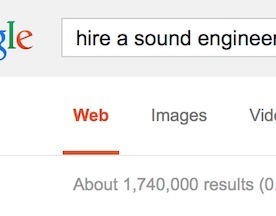

I’ve had this idea knocking around my head for over a month now, and I need to get it out.
The hardest part about being a sound engineer is finding work and organizing time.
I want to change that.
Finding Work
I’ve moved across the country and overseas six times since I started my career. It takes years to build a professional network to fill your calendar with great projects, and every time you move you have to start over again. It’s hard. There has to be a better way.
Imagine a world where you aren’t limited by geography. Where you can move to a new city and pick up right where you left off. Imagine spending several years building up a client base in New York City, then moving to Austin, TX and quickly being hired for work of a similar quality, because your reputation and references moved with you. Way better than the status quo of being limited by personal contacts and gate keepers, right?
This is how I image it works for a contractor who does well on Angie’s List. They can work for several years in one city, accruing good ratings and reviews, then move to another city where those ratings and reviews still benefit them. Sound engineers could probably have a similar experience using Angie’s List or LinkedIn, but I think that we are a broad and diverse enough industry that we need our own online home.
Organize Time
Once every year I miss a gig because of a calendar error, usually because I just plain didn’t enter the details. It feels terrible. I’ve been working in pro audio for over ten years and this still happens. It’s not the only mistake I make, either. On occasion I get lazy, make assumptions, and lose money. How can I protect myself from me?
The Solution?
Clearly, I need a booking agent. Unfortunately that’s not going to happen, but I can put automation in place that will protect me from some of the fail points I mentioned above. What does a booking agent do? He knows the kind of work that I like, the conditions I’m willing to experience, and the amount of money I want to make. He can promote my work to possible clients and turn down the things that don’t fit. I know you are thinking that these things can’t be automated because there are so many details involved when booking technical labor. I agree, but what if we could make it super easy to book in the initial steps, and then follow up with all of the details once the job has basically been sold?
One of the great things about TaskRabbit is that posting a job only takes 30 seconds. Someone will grab it in the next few hours and then there will be a followup conversation for details. You skip the time-consuming back and forth communication that you encounter when hiring someone through Craigslist. TaskRabbit mostly handles simple tasks like cleaning the yard or picking up groceries, but I think we can take a lesson from them.
Doesn’t This Exist Already?
What about eLance, Production Hub, OffStage Jobs, Music Jobs, and ARTsearch? Those are all quality job listing sites, but how many of you have actually gotten any work out of them? The big problem is that hardly anyone goes to the internet to hire live event staff. No one is searching Google for sound engineer. In fact, if you check Google Trends, the term sound engineer is trending down since 2005.
I want to change that. When you need a plumber, you search the net. When you want to eat at a restaurant, you go to Yelp. When you want to find a general contractor, you use Angie’s list. Live event specialists need a central hub where everyone in the world knows we can be found and booked easily. There are lots of features that I want from a product like this, but the first step is to move away from personal contacts as gate keepers, and move toward an open market and meritocracy.
Take Action
Am I crazy? Is there someone offering this service already and I missed it somehow? If so, let me know!
Think I’m sane? Then sign up to help me build something great.
I will only email you about this specific project.
This article Opening Up The Marketplace To Sound Engineers appeared first on Sound Design Live. If you found it helpful, please donate to show your support.
Read Related Articles:
How Much Do Live Sound Engineers Make?
Beyond FOH: Job Search Advice For Sound Engineers

February 16, 2014
Save $500 On Your Taxes This Year


 Are you leaving $500 on the table? You might be.
Are you leaving $500 on the table? You might be.
In my recent interview with Stephen Fishman, I asked him about the most common tax deductions that independent contractors get wrong. He said, “One great deduction that people don’t take or are afraid to take is the home office deduction, which if you are a renter can be worth a great deal because ordinarily you can’t deduct your rent at all. If you live in an expensive area like the bay area, that can be a lot of money.” So let’s take a look at Fishman’s article, The Home Office Tax Deduction, and discover how to use it and how much we can save.
Disclaimer: I am not a CPA (certified public accountant); I don’t even play one on television. Please do not consider this certified legal advice.
Wait a minute, am I even eligible?
Requirement #1
The home office deduction is available to renters and homeowners alike. It is available for office space and other areas you use for business in your home — such as a studio, workshop, or garage. And according to the IRS, your “home” can be a house, condo, or apartment unit — or even a mobile home or boat, as long as you can cook and sleep there. However, you must meet two tax law requirements to qualify for the home office deduction:
Requirement #1: Regular and exclusive use. You must regularly use part of your home exclusively for a trade or business.
Regular is easy. This just means that you are working from home a couple of days a week or a few hours a day.
Exclusive is a little harder. How many of us use our computer exclusively for work? Well, maybe Harry Mack. But besides him, no one! Don’t worry. The important thing is where you use your computer.
The best way to handle this is to have a room that is dedicated to business. Guess what? I don’t. As an alternative, make sure that your work area is clearly defined. Put up a room divider, for example. Fishman offers a few more tips to establish your legal right to deduct for a home office.
Document it. Photograph you home office and draw a diagram showing where it is located.
Have your business mail sent to your home. Duh.
Keep track of the time you spent working at home. This is easy. Just add these times to your calendar and keep them for…ever.

I know it feels like we’re barely squeaking by, but trust me: we’re going to make it. I’ve been taking this deduction for years and it’s worked out fine. Based on other articles that I’ve read, as long as you are faithful to the spirit of the requirements, the IRS will accept it. Basically, treat your home office like you would a corporate office. You don’t have to rush out of the room every time you get a personal phone call, but you also can’t hold jello wrestling matches there. Unless, of course, that can be considered managing your business. If so, congratulations, and are you hiring? #livingthedream #jobplease
Beware
The home office deduction is only available to you if you are running what Fishman calls “a bona fide business.” Don’t worry, if you’re charging for your services and making money, not just helping friends for fun, then you qualify. Still worried? Read How To prove Your Hobby Is A Business.
Requirement #2
Requirement #2: You must also be able to show that you use your home as your principal place of business.
Your home automatically qualifies as your principal place of business if both of the following are true:
You conduct the administrative or management activities of your business from home.
You have no other fixed location where you conduct those activities.
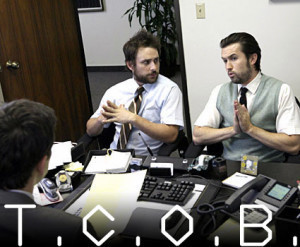 Both statements are true for most sound engineers. We seek out gigs, invoice clients, and generally TCOB from home, then head out to the concert venue, theatre, or hotel to make ears drums bleed. I think this requirement is mostly to keep people from claiming their office space AND their home office. So if you own an AV company and manage your work from the warehouse, tough titty.
Both statements are true for most sound engineers. We seek out gigs, invoice clients, and generally TCOB from home, then head out to the concert venue, theatre, or hotel to make ears drums bleed. I think this requirement is mostly to keep people from claiming their office space AND their home office. So if you own an AV company and manage your work from the warehouse, tough titty.
How Much Money??
Using the simplified deduction option, which most of us will, you can deduct $5 per square foot with a maximum of 300 square feet. So if your office occupies a 10’x10’ square, you can deduct $500. Boom.
It could be less, but it could be more. If you don’t use the simplified deduction option then you will need to answer a list of questions about your home office. This year I got a home office tax deduction of about $5,000. Why? Mostly because of the high cost of living in the bay area. I was paying $1,000/month for a triangle-shaped one bedroom, and using almost half of it as a home office.
Conclusions
Many people don’t take the home office deduction because they don’t understand it. Now you do. And you should, because while it is not completely defined, most freelance sound engineers meet the eligibility requirements and you could save a bundle.
This article Save $500 On Your Taxes This Year appeared first on Sound Design Live. If you found it helpful, please donate to show your support.
Read Related Articles:
10 Critical Tax Questions Answered For Sound Engineers




